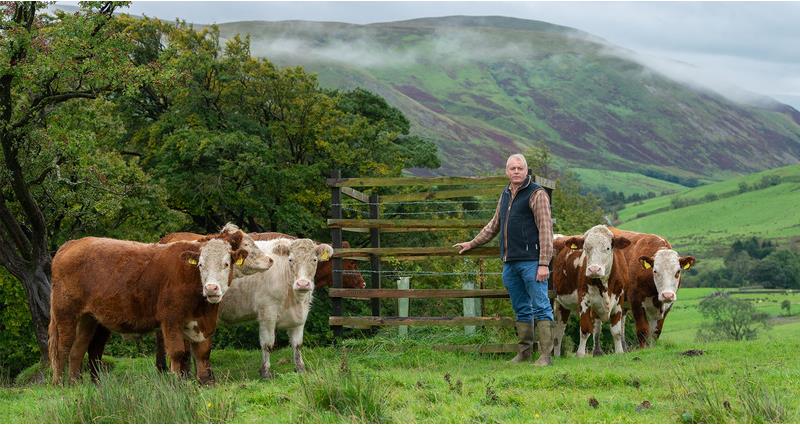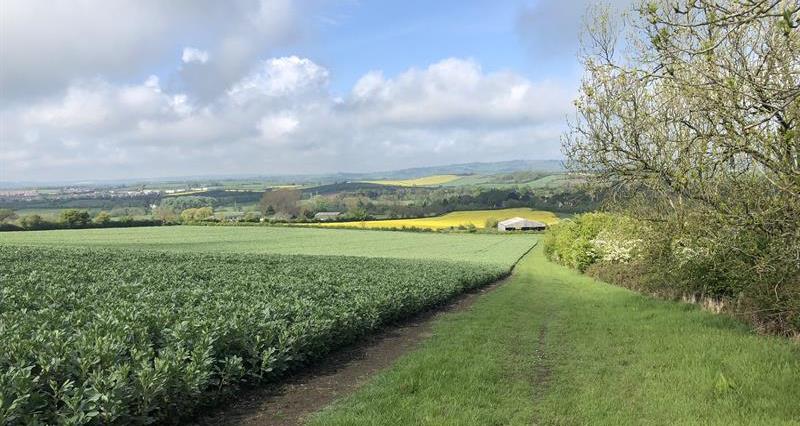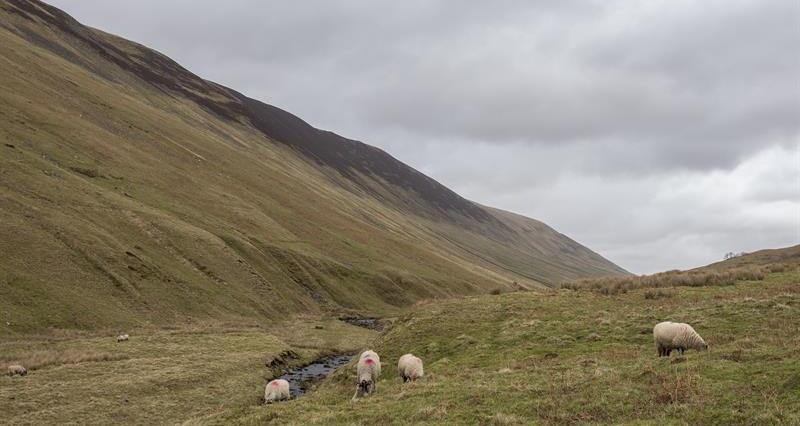A dozen farmers and commoners in the North of England have joined together for the dual benefit of improving their business prospects and enhancing the environment.
Collectively managing more than 5,000-hectares of land currently, the OFFC (Orton Fells Farmer Cluster) has secured funding for a range of activities, including individual business reviews, carbon audits and farm visits.
Launched in 2020, the OFFC is chaired by Jane Lane, whose family runs Tebay Motorway Services and farms the surrounding land, some of which comes with fell rights. The holding finishes store cattle and produces lambs, with meat sold through the Services’ farm shop and kitchen.
“As farmers of common land, we have a long history of collaborative working,” says Jane.
“The development of the cluster just formalised the arrangement. We have visited other farms as a group, hosted meetings on our own farms and organised presentations by expert speakers.
“Local schools and colleges have visited our holdings and we have worked with farm business advisors on achieving maximum business efficiencies, as well as carrying out carbon and biodiversity baseline audits and participating in a soil health research study. In addition, the cluster has been awarded funding through the Farming in Protected Landscapes initiative to pay for a part-time facilitator.”
Farming and the environment
The area of Orton Fells mostly falls within the boundaries of the Yorkshire Dales National Park while some of the western fells are in the Lake District National Park.
“One of our main purposes is to demonstrate that upland farming has a key role to play in sustainable food production, environmental delivery and land use change,” continues Jane.
“While working toward this goal, we have also identified areas for change with potential advantages for our own businesses. On my own family farm, we are changing our grassland management and grazing, introducing diversity in our swards and working with breeds which thrive in the local landscape.”
“Ideally, we would like to see clusters similar to ours develop and grow in the region and this would offer the potential to meet up to exchange ideas and perhaps work together on joint initiatives.”
Orton Fells Farmer Cluster group chair Jane Lane
While the group has received a number of enquiries from potential farmer members, Jane insists that growth must be strategic.
“The geographical proximity of the farmed land is of immense value to the cluster,” she says.
“We are creating wildlife corridors, for example, so it is essential that member farms are linked for this purpose. In addition, our history of close working relationships plays an important part in achieving co-operation; I was told at the outset that it can take as long as two years to build trust for this type of project.
“Ideally, we would like to see clusters similar to ours develop and grow in the region and this would offer the potential to meet up to exchange ideas and perhaps work together on joint initiatives.
“The cluster has received funding from a variety of sources, including the Yorkshire Dales National Park and Farming in Protected Landscapes.”
 The cluster and farm businesses
The cluster and farm businesses
Steve runs an all-year-round calving herd with a 9,000kgs milk yield average. The main sheep flock comprises Rough Fell ewes and there are also some Beltex-sired crossbreds. Lambs are sold on a deadweight basis.
A founder member of OFFC, Steve was enthusiastic about the concept.
“Changes were always on the cards when we left the EU and with the prospect of declining support payments, I felt that I needed to take action,” says Steve, who farms with his wife, Barbara and their son, Michael.
“My 400-acre farm on its own has limited potential for enhancing the environment on a significant scale and I knew that a bigger impact could be made by teaming up with neighbouring producers.
“Being part of a cluster group immediately improved our environmental ‘offering,’ in terms of hedges, trees and the potential creation of a wildlife corridor, for example. As expected, the cluster has attracted positive attention from influential organisations, including the Environment Agency.
“Several members have a long-standing arrangement for pooling machinery and labour. With help from my neighbours, my 150-acres of grass can be cut in just five hours, saving time and money. It seemed like a natural progression to join forces through the cluster.”
School visits have been facilitated and funded through grants obtained as a result of his membership, he says.
“Hosting visits from school children has raised my awareness that, despite living in a rural area, their general understanding is fairly minimal. My milk is sold to Nestlé and the company is very keen on this type of activity, so it is a ‘win-win’ situation.”
“Being part of a cluster group immediately improved our environmental ‘offering,’ in terms of hedges, trees and the potential creation of a wildlife corridor, for example.”
Founder member of the Orton Fells Farmer Cluster group Steve Dunning
The cluster has also led to farming innovation. “It organised for us to listen to a number of expert speakers and I have been persuaded to try a paddock grazing system, moving the cows every 24-36 hours,” Steve says. “This is the first year that it has been tried and I am extremely pleased with the results.”
He adds: “One of the best elements of cluster membership has been the business review. The accountant who looked at our books confirmed that the farm would be viable without BPS and that has given me a lot of confidence about the future.”
Tim Winder, Gaskill Row, Tebay
Gaisgill Row spans 500 acres and has fell rights that equate to 700 acres across three commons. The unit’s carbon neutral status has allowed the Winders to sell beef from the majority of their finished stores to high-end London restaurants, while two-thirds of their lambs are marketed to the same outlets.
Native-breed store cattle are bought at 12-24 months and either grazed or fed grass silage until the final six weeks, when they are given a soya-free mix containing barley, distillers’ grains and minerals. This regime ensures that the meat meets the buyers’ preference for white, rather than yellow fat.
The flock mainly comprises Aberfield composite ewes, which lamb in late March to Abermax or Charolais cross Texel tups.
Tim is also an OFFC founder and the organisation has played a role in helping to establish and maintain the farm’s carbon neutral status. The farm has planted 15,000 trees and has 200 acres of wood pasture.
“The OFFC visits to other farms have been invaluable,” Tim says.
“I could see that wood pasture was working well on a smaller scale on other units and I knew that replicating it at home would work, because the principles are the same, whatever the acreage. I also had the opportunity to talk to like-minded farmers and find out about all the pitfalls before I got started.
“Membership of the cluster has led to many useful connections being made. When it came to choosing tree species, I relied on advice from the Woodland Trust. I am certainly no expert on the subject, although I have learned a lot since establishing the wood pasture. A small percentage of plantings failed initially and I soon discovered that trees will only grow if the right species is planted in the right place!”
He adds: “I am currently making an application for mid-tier Countryside Stewardship and hoping to implement the low input and herbal ley options.”



